#but sometimes i have fantasies specifically centered around being inclusive of my disabilities
Text
guys guys idea
#every#so often i have like#disability specific kink fantasies#like ok a lot of my fantasies are not Actually Reasonable in the ways i fantasize them bc of my disabilities#but sometimes i have fantasies specifically centered around being inclusive of my disabilities#like#god the thought of collaring someone and clipping and over the shoulder leash to their collar???#and having them walk beside me while I'm in my chair??#and it Does Something to me#so anyways if y'all would like content like that and can be not weird about it let me know#sorry this is only semi coherent it's been an insanely long day lmao#minors dni#terfs dni#cis men dni
8 notes
·
View notes
Text
Feminist Relevant Themes
<-Previous (Introduction)
To talk about Magia Record’s writing in detail, it helps to understand how the game is structured.

Magia Record has many story modes:
Main Story: The main plot, centered on new protagonist Iroha arriving in the city of Kamihama to search for her missing sister. Everyone can read this at any time, and new chapters come out every few months.
Another Story: The events of the Main Story, but told from the point of view of the original Madoka Magica cast. Also always available to everyone.
Magical Girl Stories: short stories centered on one specific magical girl - usually they tell the backstory of the girl’s wish. Can only be watched after obtaining the character in the gacha.
Mirrors Story: A very slowly updated story unlocked by completing many player vs. player battles.
Event Stories: Short stories that come out roughly every two weeks. Sometimes introduce a new character for the gacha, sometimes related to a seasonal holiday. Playable to anyone around during the event (and will be stored in the archive afterwards).
Costume Stories: Tiny story snippets involving a character wearing a special outfit. Implemented one year in and unlocked by obtaining both the character and the outfit in question.
Good
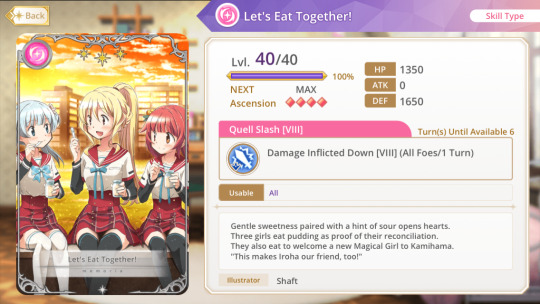
Female Friendship
As with the better side of magical girl media, the game’s biggest feminist plus is its complex female characters and focus on female friendships, including some great examples of female mentors and role models. The mechanics of the setting are even tweaked to facilitate this - gone is the TV series’ lonely, competitive system that isolated girls from each other. Instead, in present-day Kamihama, witches are so strong and plentiful that magical girls are better off forming teams to support one another.
While this change arguably waters down some of the thematic weight of the original (in that this isolation was another example of how Kyuubey’s system is an easy metaphor for other oppressive systems), I find it a worthy trade-off. Allowing for magical girl teams to exist results in much richer possibilities for interactions between characters, especially welcome in a sprawling game with far more narrative content than a one-season anime.
And the game takes good advantage of this - no two magical girl teams are exactly alike, both in terms of internal dynamics and how they interact with other teams.
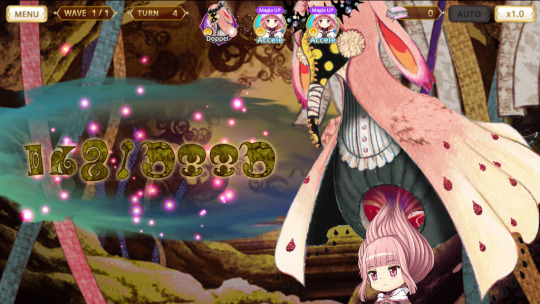
Doppels
The main gimmick of the game’s story is the existence of “doppels” - a mechanic where a magical girl partially transforms into her own witch to unleash a powerful attack. And from gameplay to story to art, doppels are excellent. They look cool and they’re rewarding to unlock and use in game. From a feminist perspective, I also love the idea of reclaiming witches, the “adult” form of magical girls, into a source of salvation and empowerment for girls* instead of a curse. On a meta-level, it echoes a common magical girl trope of the character transforming into an older version of herself, while specifically to Madoka Magica, it’s a creative way to dismantle the misogynistic implications of Kyuubey’s system!
(*There are supposedly drawbacks to doppels, but that bit of setting mostly serves to make them a ~dangerous forbidden technique~ that shouldn’t be overused.)
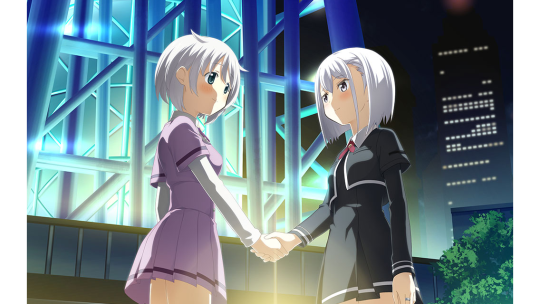
Struggling against class prejudice
The tensions between different wards of Kamihama are a key component of the setting, and affect many character interactions. One aspect the Magical Girl Stories are good at is showing how arbitrary and hurtful this discrimination is, and how difficult it is to overcome prejudice once it has become entrenched. It’s made abundantly clear that Kamihama would be a better city without these attitudes - the question is, how to get there?
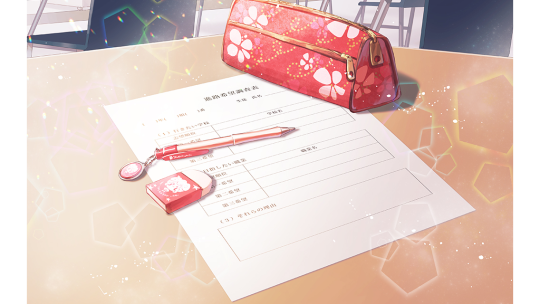
A variety of careers
Several girls make wishes or have backstories centered on what they want to do when they grow up. What’s especially neat is that most girls ask for the opportunity to follow their passions, rather than having a talent magically granted to them - thus avoiding the pitfall of having a female character’s abilities originate from a power granted by a male character.
The range of career interests depicted isn’t as amazing as it could be (In a cast of 80+, I would love to have more than three girls representing STEM), but there’s some decent variety. Many girls aspire to take over their parents’ family business, for example.
And even some characters who follow more seemingly feminine careers (a model, a chef, an artist, etc.) have serious narratives centered on the skill and effort needed to succeed in those highly competitive fields, which is quite refreshing to see.
Mixed
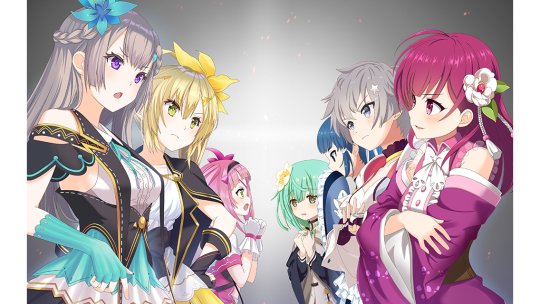
The many different ways to be a girl
The nice thing about having a large cast of female characters is that it gives plenty of opportunities to show how all of these characters are different. And in general, Magia Record does very well on this front! One aspect I’ve particularly been enjoying is the how the cast has widely varying tastes in fiction. Yes, there are girls who like dreamy romances, but there are also girls who bond over their shared love of a hotblooded shounen series!

Where this falls down somewhat is an overuse of “but look, she has a secret feminine interest.” Sometimes this plot can work, if coming at it from the angle that superficial judgments can be misleading, or that there’s nothing wrong with having feminine interests. But when all the more masculine-presenting girls end up with a hidden fondness for stuffed animals, the sheer repetition becomes rather irksome. It’s as though the game feels the need to insist “but look, she really is a girl!” because the audience wouldn’t believe it without such a trait.
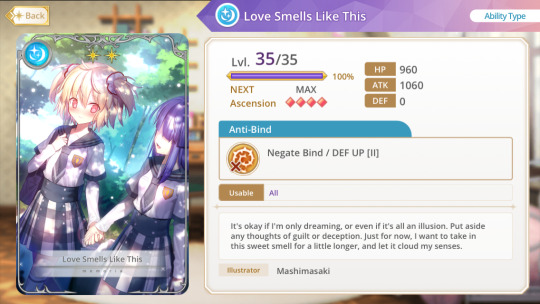
LGBTQ+ characters
In terms of LGBTQ+ content, the game feels rather similar to the original anime and other Madoka spinoffs. That is to say, there are tons of shippable f/f pairings that get teased, but as of the present, only one new playable character (and a tiny sample of minor characters) are explicitly confirmed to be lesbians. No trans or otherwise queer characters either, unfortunately. (Though of course that’s not to stop a good interpretation or headcanon!)
However, as a whole, the game is oddly averse to showing the characters in active, healthy relationships. One of the early frustrations I had with the new character’s portrayal was that the game’s one mutual gay relationship was never directly shown on-screen and gets broken up in favor of more ambiguous teasing. That being said, all the het relationships are treated similarly, either never being confessed and requited or never getting shown on screen. So… I suppose there’s not actually a double standard here, but players hoping for lots of canon yuri content might end up a bit disappointed.

Also, a note on Homura specifically - this game’s version is “glasses Homura,” who hasn’t realized she’s in love with Madoka yet. So despite what you might expect given Rebellion, in Magia Record there’s nothing beyond heavy hints and ambiguously cute scenes between her and Madoka.

Characters with disabilities
A few characters in the game have difficulty speaking. It’s not made clear if this is a speech impediment or something like social anxiety (or autism - I know I’ve seen headcanons for that). There is some depiction of these characters getting bullied, but in each case the character ultimately finds a group of friends who love and support them as they are.
After two years, now there is technically a magical girl who uses a wheelchair. (And it’s a cool custom wheelchair too!) Unfortunately I hesitate to count this as a full positive, because shortly after she appears in it, the character becomes unable to transform and fight for an unrelated reason, so we haven’t seen her in battle since. But who knows - the story’s still moving forward on the Japanese server, and there’s likely to be more content with her in the future.
At the end of the day, though, this is a setting with magic wishes and healing effects. Thus, it’s very common for girls to wish to cure someone’s illness, or to use their abilities as a magical girl to cure themselves, which can easily fall into ableist tropes.

College age magical girls
Yes, really! Although even the oldest characters are only nineteen. However, there’s also a subplot about how two of the nineteen-year-olds are losing power because they’re older, which… hm. The message that we all need to accept passing the torch to the next generation is generally a valuable and good one. Aiming it at older teen girls just on the verge of adulthood is where the implications nosedive into unfortunate. Young girls already get far too many messages that their worth is entirely dependent on their youth/beauty/innocence and that it’s better to stay a “girl” than to be a fully grown “woman.”
The entire reason it’s exciting to see college age magical girls in the first place is that even now, it’s rare to see adult women as protagonists in these types of fantasy adventures. By introducing these young adult characters only to caveat their inclusion with“they’re getting too old to be here”, it puts a very sour note on what’s otherwise a welcome expansion of the Madoka Magica universe.
(It’s also hilariously contradictory to other spin offs in the Madoka Magica franchise, including the implications of the anime canon itself, so… whoops?)
Bad

Lack of diversity
(Particularly racial diversity.)
The only non-Japanese magical girls are from the pre-existing Tart Magica spin-off set in medieval France… and Meiyui. (And maybe Alina.)
Meiyui is a complicated case - her family has ties to both Japan and Hong Kong. Meiyui herself is a fun character, but she also ticks a lot of the checkboxes for a Japanese stereotype of a Chinese person (a la Xiao Mei in Fullmetal Alchemist). As a white person only familiar with US culture, it’s not my place to make a judgement call here, but I’d love to hear from someone who knows more!
The largest disappointment, though, is in wondering what might have been. The Madoka Magica anime implied that there are magical girls all over the globe from every different time and culture, so the game’s narrow focus on one modern Japanese city greatly limits the setting from its full potential. And even within that limitation, the sheer homogeneity of the new cast is starting to get awkwardly same-y.
The arc two’s logo teases what might be girls from several other backgrounds, though, so perhaps this will improve in the very near future. Of course, success will depend on the writers’ abilities to handle other cultures. Which, when given the example of Meiyui, might actually be cause for concern...

Revolutionary Girl Utena, this ain’t
In a game full of decent-to-good backstories, you’ll sometimes hit an unfortunate and very disappointing outlier.
My personal least favorite is the victim-blaming one mentioned in the content warnings. Another low point is a story where a girl frantically diets as a response to another girl’s comments about her weight.
Then there’s the backstory the above picture comes from. It involves a girl who has to drop out of sports because her next school only has a boy’s team - and instead of challenging this situation, it’s the inspiration for her to discover she’s actually happier as a cheerleader anyway. Hm.
This last case is actually pretty emblematic of the game as a whole. Whoever’s doing the writing (the credited scenario team is four people, and from the names at least two might be women?) mostly seems to mean well, but they occasionally step hard into the -isms that come from not actually thinking about the problems with the status quo.
So the game isn’t typically hateful, but it doesn’t push the envelope in any revolutionary directions either. As a result - and it feels weird to say this, but - I really miss having Urobuchi as the writer. Sure, his writing had its own problems, but in comparison, it was at least genuinely thought-provoking. The way that even the adult female characters got complexity and screentime, that whole conversation between Sayaka and the misogynistic men on the train, the compelling exploration of consent and determination that underlies the whole anime – even six years later, these aspects hold up and stand out.
Magia Record is an inversion – far more pleasant on the surface, but without the backbone and depth that made the original so thematically intriguing despite all the suffering.
Next (Other Writing Aspects)->
#puella magi madoka magica#pmmm#magia record#magical girls#feminist analysis#my blog organization tags#magia record analysis#my feminist friendly magireco review#madoka magica#magical girl genre#magia record jp#magia record na#my ramblings#haha this section is so long#nothing else even touches it#and even then there’s so much other stuff I could rant about lol
16 notes
·
View notes